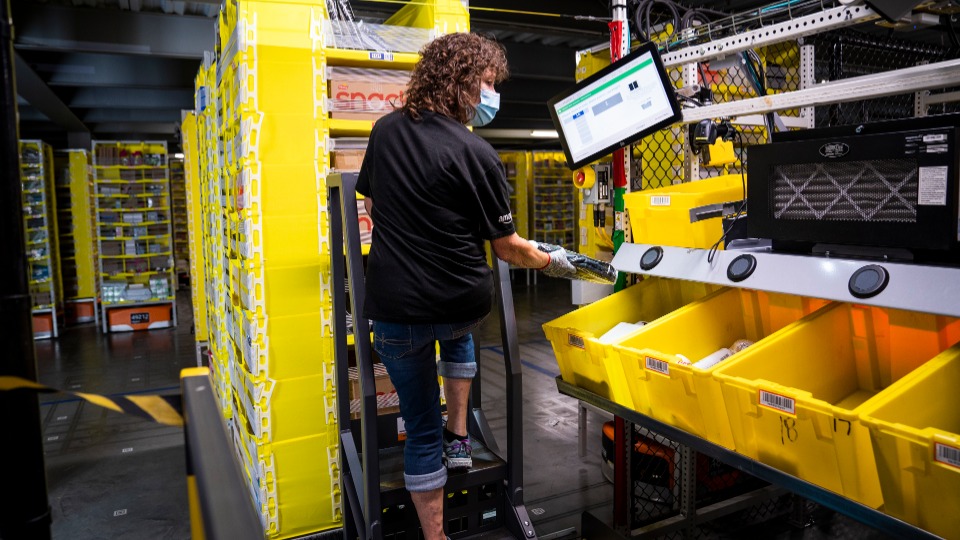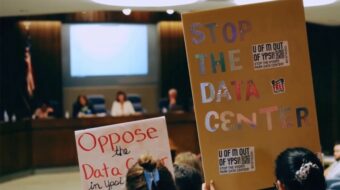
In a recent interview with The Real News Network, Amazon worker Darryl Richardson described his job as a picker in the Bessemer, Ala., fulfillment center. He clocks in, and a video stream tells him where to go. He logs in at his station, then waits until the robot comes. A video stream tells him what to pull. He puts each item where a light indicates, releases the robot, and another robot comes. He repeats that same process, standing, alone, for the whole 10-hour shift, except two closely-timed breaks.
About eight hours in, he starts to feel exhausted, as though he’s given all he can give, but he keeps working at breakneck speed. All his movements are being monitored, and he doesn’t want anyone to tell him that his “tote transition time isn’t what it’s supposed to be.”
The Bessemer Amazon workers are now voting on whether or not to unionize with the Retail, Department Store, and Warehouse Union. In its anti-union propaganda, Amazon regularly touts its $15 minimum wage and benefits package as reasons its employees don’t need a union. But Darryl Richardson’s job description makes it obvious that wages aren’t the only issue. The workers’ demand is for a voice on the job. As the rationale goes: “Vote Union Yes, so we can have a voice in improving our working conditions.”
Years ago, my husband worked as a picker at a Wisconsin company called Figi’s, a mail-order company that specialized in sausage-and-cheese gift baskets. His experience was the polar opposite of Darryl Richardson’s. His pay topped out at $9 per hour, and most workers didn’t qualify for benefits. But apart from the low pay, it was a great job.
People talked and laughed all day on the line. If you wanted to know what was going on in town, you asked a Figi’s line worker. There were potlucks and picnics, prizes, free samples (sanctioned and unsanctioned). Workers had a lot of control over their time. The managers knew the workers and tried to help with problems.
The company was well-liked locally because they hired and re-hired people who were just out of prison or rehab. Online employee reviews frequently use the word “fun.” To quote from Indeed.com: “It was a fun place to work.” “It was a good place to work.” “The workplace was relaxing, and by the time I got home I was ready to take care of housework and cook a warm meal.”
My point is not to wax nostalgic for a kinder, gentler form of capitalist exploitation. Don’t get me wrong—it was hard to make ends meet on $9 an hour. Workers had major problems getting health care and child care. They needed a union, too. But the comparison highlights how much and how fast Amazon is changing the stakes of labor organizing.

For Figi’s workers, “$15 and a union” would have been a good rallying cry, as it is for many fast food workers today. In the South, especially, $15 sounds like good money. It doesn’t sound as good when we compare it to the mind-bending fortune one man, Jeff Bezos, is making off of other people’s labor. But in any case, what good is $15 if you are dehumanized for ten hours and come home so sick and tired that you can’t enjoy your life? Even a much higher wage wouldn’t compensate for the pressures automation and surveillance are putting on workers’ minds and bodies.
In some respects, the situation at Amazon—and other corporations racing to implement the same technologies—resembles the early days of industrialization, when technology outstripped public demand for safety regulations. Amazon’s warehouse accident rate is nearly double the industry standard.
In the 19th century, workers whose hands, hair, or clothing got caught in open machinery understood the need to cage the wheels, yet owners were unwilling to stop production long enough to implement even such simple protections.
In an era of underregulated, rapidly expanding industrial capitalism, it was cheaper for owners to pay the small fines imposed by the courts. The terribly high price workers were paying in lives and limbs carried little weight. In the U.S., accident rates did not fall steadily until Workers Compensation laws that the unions fought for and won greatly raised the fiscal cost of accidents to the capitalists.
Automation doesn’t have to be a bad thing. In a socialist economy, where fair distribution guarantees that everyone’s basic needs are met, automation could free workers from tedious or dangerous jobs. Robots could increase the amount of leisure time humans have to spend with family and friends, on hobbies, the arts, sports, social contributions, and so on.

But Amazon has taken that potential good and used it to create a worker’s worst nightmare. Instead of making machines serve humane purposes, the human worker is made into “an appendage of the machine.” Not even a much higher wage would make it ok for Amazon to so brutally disrespect workers’ safety and dignity, their status as persons. Thus, the workers in Bessemer are demanding some measure of control over the quality of their lives.
Like many catalog-based businesses, Figi’s could not compete with Amazon and went under in 2019. Look around your neighborhood and count the holes punched by Amazon. Your local bookstore, where people met and talked, is probably gone. The mall where you hung out as a teen emptied, stood vacant, and may now be an Amazon distribution center.
Such shifts undermine the local tax base that funds schools, libraries, and other community services. But Amazon has spread its tentacles even further, into every corner of the economy, including media and food. It sells computing space to the CIA, racist face recognition software to police and ICE. The more control Amazon gains—the more it monopolizes and becomes an oligarchy—the less power any of us will have over the quality of our lives.
The union vote in Bessemer is important for the workers, who desperately need a voice. It’s also important for the South, which has been an Achilles heel for labor movements. The South’s history of racism and state-sponsored anti-unionism has attracted exploitative employers and weakened workers’ bargaining power elsewhere. Ultimately, though, the fight against this voracious behemoth is important for everyone.
If you want to join it, check out SouthernWorker.org and AthenaForAll.org.










